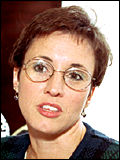EXPERTS AT CRIME BUT NOT COMMUNICATION
Criminologists Criticize Their Organization
November 12, 1998
By Hoag Levins

|
|
Photo: Hoag Levins
Dr. Kimberly Cook complains 'Reporters can't find us.'
|
|
WASHINGTON, D.C. (APBnews.com) -- As vast in scope as it is crowded in space at this sprawling hotel, the American Society of Criminology (ASC) screams out for a central communications strategy, some of its members told APB News.
While the ASC has successfully drawn together thousands of the world's most prestigious crime experts, the hallway consensus here in the Marriott Wardman Park is that the organization has not done well at communicating its members' expertise to the media. This was nowhere more apparent than this morning, when two groups whose members were literally yearning out loud to find each other failed to do so.
Crime reporters seek expert sources
Crime-news reporters from newspapers, magazines, TV stations and online news services gathered for the opening sessions of the Criminal Justice Journalists (CJJ) conference (held in conjunction with the ASC conference) in Atrium number 1.
Throughout the morning, various CJJ speakers recited calls for what has become the association's mantra: context in crime news. They emphasized the importance of reporting criminal events and trends in a broader context. This requires journalists to interview criminology experts who can provide fresh perspectives. But some CJJ attendees wondered just how to locate such new sources.
Simultaneously, just 200 yards away through the dense corridor crowds, sitting around a table in another of the hotel's atriums, members of ASC's Division on Women and Crime bemoaned their inability to make contact with members of the press.
Expert sources seek crime reporters
"It's very frustrating," said Dr. Kimberly J. Cook of the Department of Criminology of the University of Southern Maine in Portland. "The press always quotes the same few tired sources on any crime subject. Reporters don't come to people like us who have academic expertise in a specific crime area to get our comments and insights. But how can they find us? You would think that the ASC would have some sort of speakers' bureau or experts list or an online database that is an index to our fields of expertise and contact information. But the association doesn't."
Neither Cook nor the other Ph.D.s gathered around the table knew about that nearby room filled with leading U.S. journalists looking to identify news sources. They shook their heads wearily when informed of that fact.
Dissatisfaction with ASC
They also indicated a rising sense of dissatisfaction with the ASC because of its failure to act effectively as a clearinghouse to help journalists across the country identify and contact ASC members who are eminent authorities in their field.
"Yesterday, we had about 20 criminologists from various universities sitting around saying, 'How can we get access to the press -- how can we let reporters know that we have all this research and all these resources related to the crime topics they're writing about?'" said Dr. Nancy A. Wonders, associate professor at the Department of Criminal Justice at Northern Arizona University in Flagstaff. "The ASC could help the media find us," she said.
Critical of ASC Web site
Some of the criminologists were also critical of the ASC's new Web site, launched earlier this year. It does not offer an online database of members' expertise and contact information.
Dr. Mona J.E. Danners, assistant professor and graduate program director of sociology and criminal justice at Old Dominion University in Norfolk, Va., said "there's a feeling among many of us that the ASC doesn't understand the need to do this. Many criminologists feel that we will soon have to get together and determine how to best do this for ourselves outside of ASC."
ASC press liaison agrees
Surprisingly, when asked to respond to members' criticism, ASC's press liaison, Dr. James Fox, agreed that much of the criticism was accurate. Fox is the dean of the College of Criminal Justice at Northeastern University and handles the Society's media-related contacts.
"This Society has routinely shied away from being involved with the media as well as with public policy issues," Fox explained. "It's been a scholarly tradition."
"There are a number of ASC members who have a negative attitude about publicity," he continued. "Many feel that the treatment of crime in the media is not necessarily a very accurate treatment. Rather than trying to be more aggressive and participate in the process of bringing crime stories to the public in a more accurate manner, many have retreated and withdrawn altogether from contact with the media."
Hoag Levins is the managing editor of APBnews.com.
© 1998 APBnews.com
.
| 
